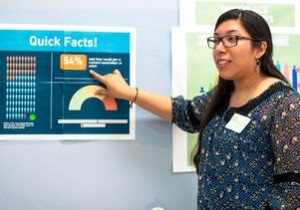
By Stefanie Ritoper
UCLA senior Reyna Orellana spent much of this year with a clipboard in hand, waiting outside grocery stores and shops in the mall. Anytime she saw a young worker on their way in or out, it was an opportunity to make her pitch — her part in a research project on young workers in Los Angeles County.
“We approached young workers leaving work or taking a break. This meant we would sometimes spend many hours outside a store,” said Orellana. “We got many rejections, but that’s part of the process of surveying. It was worth it. I learned so much.”
Orellana was one of 10 students who worked on UCLA Labor Center’s “I Am a #YoungWorker” multimedia research project that combines data, stories and images to gain insight into the experiences of young people in the workforce. Over the course of a year and a half, more than 60 UCLA students attended rigorous seminars covering the nuts and bolts of how to conduct a research project.
To gain hands-on experience, the students worked under the supervision of UCLA Labor Center faculty to develop research tools, conduct surveys and interviews, ‘clean’ data and use statistical software to analyze their results.
By the end of the project, the group had analyzed over 550 surveys and 30 qualitative interviews of young people between the ages of 18-29 who worked in retail and food service industries — the two largest employers of young workers — throughout Los Angeles County. It is one of the most comprehensive collections of data to date on the country’s young workforce.
The findings paint a striking picture of young workers who work to live, not to play. This runs counter to the prevailing stereotype that young people work just for extra money to buy clothes or go out. In fact, nearly half of young workers surveyed (48%) work to give money to their families. Less than 1% spend solely on recreational or leisure activities. The report also delves into issues about out-of-control scheduling and difficult workplace conditions, such as wage theft and verbal abuse.
“We decided to use a research justice framework because we think it’s important to have the people most impacted by the issue be the ones who shape the analysis and solutions,” said Saba Waheed, research director of the UCLA Labor Center. “We put students in the driver’s seat to build their research skills. Also, since many of our students are young workers themselves, they bring this expertise to the project.”
Many students in the young worker project have parents who are immigrants or are from working-class backgrounds, and have also worked to help their families.
Orellana is one of them. Because her parents had trouble making ends meet, she decided to help them by taking a job at age 16 as a cashier at a pizzeria, the first of several jobs she held during her high school and college years.
“My situation was not unique,” said Orellana. “Many young people struggle to balance school, work and their personal lives.”
The “I Am a #YoungWorker” project also uses multimedia platforms to make research findings broadly understandable, engaging and impactful. The UCLA Labor Center partnered with the artist collective SolArt to document young worker stories through photography and audio.
Today, community leaders, young workers and UCLA students, faculty and staff will gather at the center’s downtown location for the opening of a gallery exhibit of photos and to present the students’ final report. The center is also currently working on an animated short film on the topic, thanks to UCLA’s Lemelson Award for Innovative Digital Projects in Social Research.
Janna Shadduck-Hernández, project director at the UCLA Labor Center, said broadening awareness is the first step to positively changing conditions for the young workforce. “A quarter of Los Angeles workers are young people. They are more educated than ever before, yet well over half of young workers in Los Angeles work in low-wage jobs,” she said. “Young workers are the future of the country’s workforce, and their working conditions have huge implications for how work is changing today.”
Orellana said she hopes that her contribution to the project will help shift this trend.
“Young people depend on quality jobs for their families and for their future careers,” said Orellana. “It’s important that we change the story.”
Source: UCLA




